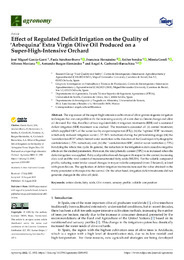Please use this identifier to cite or link to this item:
https://hdl.handle.net/11000/38481Full metadata record
| DC Field | Value | Language |
|---|---|---|
| dc.contributor.author | García Garví, José Miguel | - |
| dc.contributor.author | Sánchez Bravo, Paola | - |
| dc.contributor.author | Hernández, Francisca | - |
| dc.contributor.author | Sendra, Esther | - |
| dc.contributor.author | Corell, Mireia | - |
| dc.contributor.author | Moriana, Alfonso | - |
| dc.contributor.author | Burgos Hernández, Armando | - |
| dc.contributor.author | Carbonell Barrachina, Ángel A. | - |
| dc.contributor.other | Departamentos de la UMH::Tecnología Agroalimentaria | es_ES |
| dc.date.accessioned | 2025-11-25T10:45:38Z | - |
| dc.date.available | 2025-11-25T10:45:38Z | - |
| dc.date.created | 2022-08 | - |
| dc.identifier.citation | Agronomy 2022, 12(8), 1892; | es_ES |
| dc.identifier.issn | 2073-4395 | - |
| dc.identifier.uri | https://hdl.handle.net/11000/38481 | - |
| dc.description.abstract | The expansion of the super-high-intensive cultivation of olive groves requires irrigation techniques that are compatible with the increasing scarcity of water due to climate change and olive oil demand. For this, the effect of two regulated deficit irrigation treatments (RDI) and a sustained deficit irrigation (SDI) treatment was studied. The treatments consisted of: (i) control treatment, which supplied 100% of the water lost by evapotranspiration (ET0 ); (ii) the “optimal RDI” treatment, which only reduced irrigation water (~37–54% reduction) during the pit hardening stage; (iii) the “confederation RDI” which limited water restriction to the donation of the Guadalquivir hydrographic confederation (~72% reduction); and, (iv) the “confederation SDI”, similar water restriction (~72%) but dying the whole tree cycle. In general, the reduction in the irrigation water caused no negative effects on the studied parameters. However, the total phenolic content (TPC) was increased when the deficit irrigation was applied. Fatty acid profile showed changes with respect to the control, increasing oleic acid and the total content of monounsaturated fatty acids (MUFA). For the volatile compound profile, reducing water intake caused changes in mayor volatile compound (trans-2-hexenal), related with green flavors. The application of deficit irrigation treatments increased the value obtained in the fruity parameter with respect to the control. On the other hand, irrigation deficit treatments did not generate changes in the olive oil yield. | es_ES |
| dc.format | application/pdf | es_ES |
| dc.format.extent | 14 | es_ES |
| dc.language.iso | eng | es_ES |
| dc.publisher | MDPI | es_ES |
| dc.rights | info:eu-repo/semantics/openAccess | es_ES |
| dc.rights | Attribution-NonCommercial-NoDerivatives 4.0 Internacional | * |
| dc.rights.uri | http://creativecommons.org/licenses/by-nc-nd/4.0/ | * |
| dc.subject | antioxidants | es_ES |
| dc.subject | fatty acids | es_ES |
| dc.subject | Olea europea | es_ES |
| dc.subject | sensory profile | es_ES |
| dc.subject | volatile composition | es_ES |
| dc.title | Effect of Regulated Deficit Irrigation on the Quality of ‘Arbequina’ Extra Virgin Olive Oil Produced on a Super-High Intensive Orchard | es_ES |
| dc.type | info:eu-repo/semantics/article | es_ES |
| dc.relation.publisherversion | https://doi.org/10.3390/agronomy12081892 | es_ES |

View/Open:
agronomy-12-01892.pdf
915,95 kB
Adobe PDF
Share:
.png)
